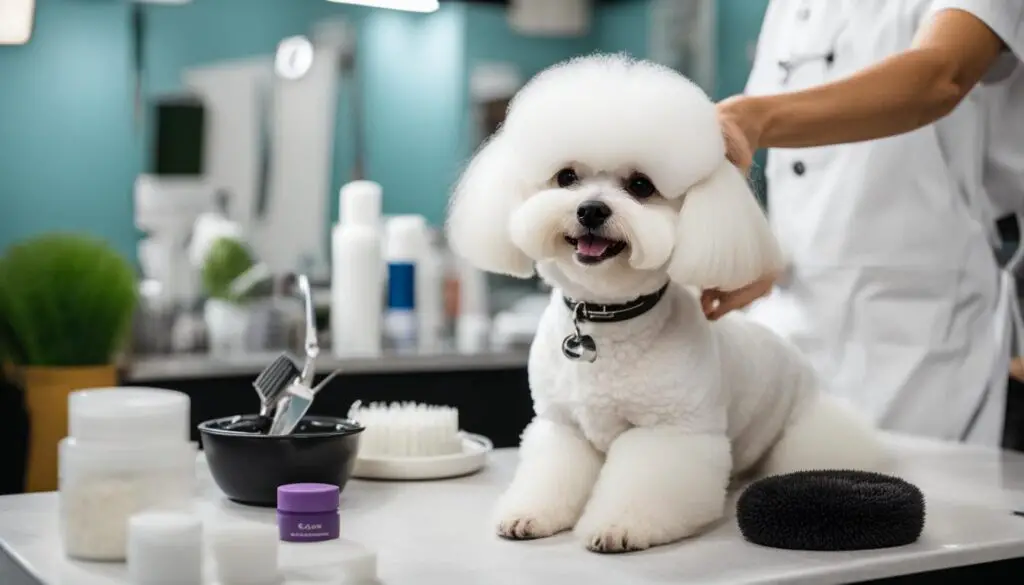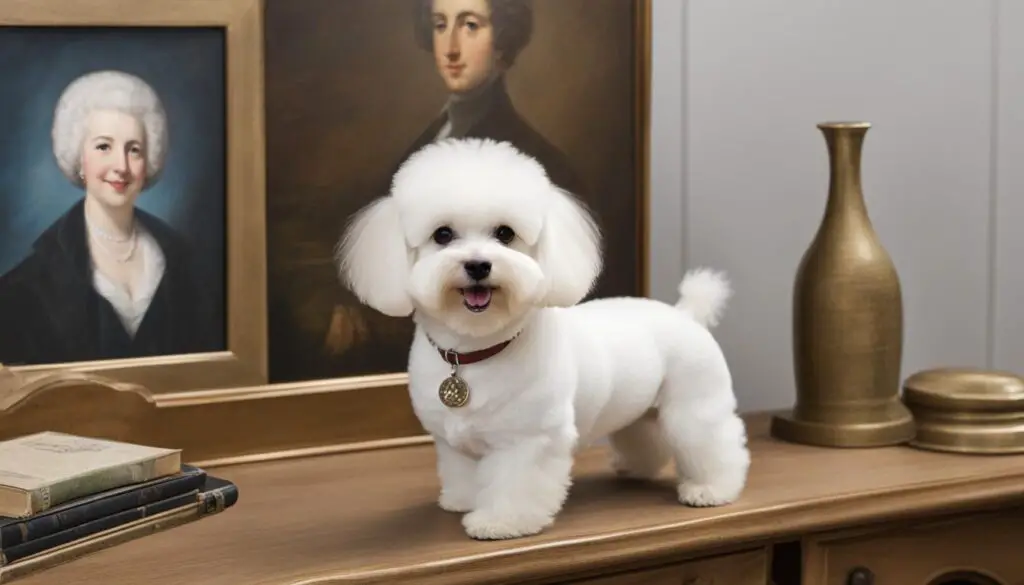As a professional copywriting journalist, I’m excited to share with you why Bichon Frises are exceptional pets for families. This charming and playful small dog breed possesses qualities that make them a perfect fit for households of all kinds. Let’s dive into the remarkable characteristics and temperament that set the Bichon Frise apart from other dog breeds.
Key Takeaways:
- Bichon Frises have a powder-puff coat that is hypoallergenic and low-shedding, making them ideal for individuals with allergies.
- Their friendly and gentle nature allows them to get along well with children and other pets, making them a great choice for families.
- Bichon Frises are intelligent and easy to train, which makes them an excellent option for first-time dog owners.
- Their relatively healthy breed comes with a lifespan of 12-15 years, offering long-term companionship.
- Overall, Bichon Frises bring joy and laughter to any home with their adorable appearance and playful personality.
Bichon Frise Care Tips
Proper care is essential to keep your Bichon Frise healthy and happy. Here are some tips to help you provide the best care for your furry friend.
Grooming
Bichon Frises have a beautiful fluffy coat that requires regular grooming. Daily brushing is necessary to prevent matting and maintain the coat’s appearance. When grooming your Bichon Frise, pay special attention to their ears, as they are prone to ear infections. Regular cleaning and trimming of the hair around the ears can help prevent any issues.
Exercise
Despite their small size, Bichon Frises are active dogs and need regular exercise to keep them mentally and physically stimulated. Daily walks or playtime in a securely fenced area will help fulfill their exercise needs. Interactive toys can also be a great way to engage your Bichon Frise and keep them entertained.
Health Issues
Bichon Frises, like all dog breeds, can be prone to certain health issues. It is important to be aware of these potential problems and take preventative measures. Common health issues in Bichon Frises include allergies, ear infections, and dental problems. Regular vet check-ups, a balanced diet, and proper dental care can help minimize the risk of these health issues.
| Common Health Issues in Bichon Frises | Preventative Measures |
|---|---|
| Allergies | Avoid exposure to allergens, such as certain foods or environmental factors. Regular grooming can help remove allergens from the coat. |
| Ear Infections | Regularly clean your Bichon Frise’s ears and check for any signs of infection, such as redness or discharge. Avoid excessive moisture in the ears. |
| Dental Problems | Brush your Bichon Frise’s teeth regularly and provide dental chews or toys to promote good oral health. |
By following these care tips, you can ensure that your Bichon Frise remains healthy, happy, and full of energy. Remember to provide them with love, attention, and plenty of playtime to create a strong bond with your furry companion.
The History of the Bichon Frise
The Bichon Frise is a breed of dog with a rich history that dates back to the Middle Ages. Believed to have originated in the Mediterranean region, possibly in Tenerife, one of the Canary Islands, Bichon Frises were popular among European nobility as early as the 13th century. The breed’s charming appearance and friendly nature made them sought-after pets, often accompanying their owners on travels.
Over the years, the popularity of the Bichon Frise fluctuated. However, it experienced a resurgence after World War I when soldiers returning home discovered these delightful companions. Their playful and affectionate personalities brought joy to many families, leading to increased interest in the breed.
The American Kennel Club officially recognized the Bichon Frise in 1973, further solidifying its popularity. Since then, Bichon Frises have become beloved pets and cherished members of countless households. Their hypoallergenic and low-shedding coats, combined with their gentle and sociable nature, have made them a preferred choice for families and individuals alike.
| Year | Event |
|---|---|
| 13th century | Bichon Frise becomes popular among European nobility |
| After World War I | Resurgence in popularity as returning soldiers embrace the breed |
| 1973 | American Kennel Club officially recognizes the Bichon Frise |
Today, the Bichon Frise continues to captivate dog lovers with its delightful personality and charming appearance. Whether in the show ring or as a cherished family pet, the Bichon Frise’s history and popularity have cemented its place as a beloved breed among dog enthusiasts.
Conclusion
In conclusion, owning a Bichon Frise brings numerous benefits, making it an ideal choice for a family pet. With their friendly and gentle nature, Bichon Frises easily become beloved members of the household. They are intelligent and easy to train, making them a suitable companion for families, especially those with children. Additionally, Bichon Frises get along well with other pets, fostering a harmonious and joyful environment at home.
One of the standout characteristics of the Bichon Frise is their hypoallergenic and low-shedding coat, which makes them an excellent choice for individuals with allergies. Their adorable appearance, combined with their playful and affectionate personality, brings endless joy and laughter to any family.
It is important to note that owning a Bichon Frise requires regular care and grooming to maintain their coat’s health. This includes daily brushing, regular bathing, and keeping up with dental and nail care. Additionally, being aware of potential health issues such as allergies, ear infections, and dental problems is essential, and regular vet check-ups and a healthy diet can help prevent them.
In summary, the Bichon Frise is a wonderful companion that will undoubtedly bring love, happiness, and endless memorable moments to any family. Their remarkable traits, combined with their hypoallergenic coat and suitability for families, make them an excellent choice for those looking for a loyal and loving pet.
FAQ
Are Bichon Frises suitable for families?
Yes, Bichon Frises make great pets for families due to their friendly and gentle nature.
Are Bichon Frises hypoallergenic?
Yes, Bichon Frises have a hypoallergenic coat that is suitable for people with allergies.
Are Bichon Frises easy to train?
Yes, Bichon Frises are intelligent and easy to train, making them an excellent choice for first-time dog owners.
Do Bichon Frises get along with children and other pets?
Yes, Bichon Frises are known for their friendly nature and get along well with children and other pets.
How long is the lifespan of a Bichon Frise?
The average lifespan of a Bichon Frise is 12-15 years.
How often do Bichon Frises require grooming?
Bichon Frises require regular grooming, including daily brushing and regular bathing, to maintain their fluffy coat.
How much exercise do Bichon Frises need?
Bichon Frises are active dogs and require daily walks or playtime to stay mentally and physically stimulated.
What are some common health issues in Bichon Frises?
Bichon Frises can be prone to allergies, ear infections, and dental problems. Regular vet check-ups and a healthy diet are important for their overall health.
Where did the Bichon Frise originate?
The Bichon Frise is believed to have originated in the Mediterranean region, possibly in Tenerife, one of the Canary Islands.
When was the Bichon Frise recognized by the American Kennel Club?
The Bichon Frise was recognized by the American Kennel Club in 1973.







No Comments